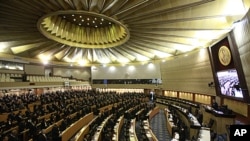Thailand's parliament is meeting this week for the first time since the July 3 general elections that resulted in a clear majority for the Pheu Thai Party and its leader, Yingluck Shinawatra.
But Ms. Yingluck faces considerable challenges ranging from selection of her Cabinet to implementing the party's populist election promises.
Thailand's first female PM
Thailand's parliament is expected to elect the country's first woman prime minister, Yingluck Shinawatra, in a vote that could come as early as Friday.
The 44-year-old’s Pheu Thai Party won 265 seats in the house and joined minor parties to hold a ruling majority of 300 seats in the 500 member House of Representatives.
At Monday’s ceremonial opening, Thailand's Crown Prince Maha Vajralongkorn, speaking on behalf of his father, the Thai king, called on lawmakers to show responsibility in office.
Thailand's Crown Prince at Monday's opening parliamentary session in Bangkok, Aug. 1 2011 (Reuters)
Crown Prince Vajiralongkorn told the almost 500 parliamentarians they had to be "honest and sincere in their duties" as well as being aware of the public benefits to the community.
The July elections capped a tumultuous few years in Thailand between supporters of former prime minister Thaksin Shinawatra and his opponents.
Thaksin's power
Thaksin is Ms. Yingluck’s brother who has been in exile since fleeing Thailand in 2008, where he faces a two year jail term on corruption charges.
Pro-Thaksin parties won elections in 2007. But court rulings and anti-government protests led to a coalition led by Democrat Party leader Abhisit Vejjajiva in December 2008 backed by the urban elite and military.
The Abhisit administration faced two years of protests by pro-Thaksin supporters, known as the Red Shirts. These turned violent last year that left over 90 people dead as security forces moved to end the rallies.
Former government spokesman and Pheu Thai Party member, Kudeb Saikrajang, says a Yingluck led government is expected to be cautious but enjoy strong support in the medium term.
"I think Khun Yingluck is very cautious and Khun Thaksin also has chosen to warm walk this way for him and for the government," Kudeb says. "I think she has learned that how to run the country, how to assume the power in a more flexible way. So she will have this instruction from many quite concerned. I think she will do much better than we expected."
Governing challenges
Analysts say Ms. Yingluck faces several challenges including selecting Cabinet posts. Political observers say she is considering some candidates from outside her party for key positions in finance, foreign affairs and defense ministries.
Political scientist Thitinan Pongsudhirak, from Chulalongkorn University, says the new government faces considerable challenges in implementing its policy program as well as from those opposed to Thaksin when he was in power.
"There will be no honeymoon for Yingluck," says Thitinan. "She has to hit the ground running. There are all kinds of questions and bumpy challenges confronting her. She has to maintain some space and some kind of workable relationship with her brother, the deposed former Prime Minister Thaksin Shinawatra, at the same time she has a lot of demands on her."
Thitinan says the demands include placating the pro-Thaksin Red Shirt movement, of which several members were elected to parliament, and implementing election promises that include higher salaries as well as a sharp increase in rice prices for farmers.
There is also the issue of several pending corruption cases against Thaksin. While the cases would only go forward should he return to Thailand, the Pheu Thai Party said it is considering an amnesty bill covering events since 2006 that analysts say is likely to include Thaksin. Such a move, that paves the way for Thaksin’s return to the country, could trigger fresh protests from pro-royalist and anti-Thaksin groups.




